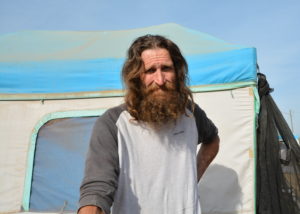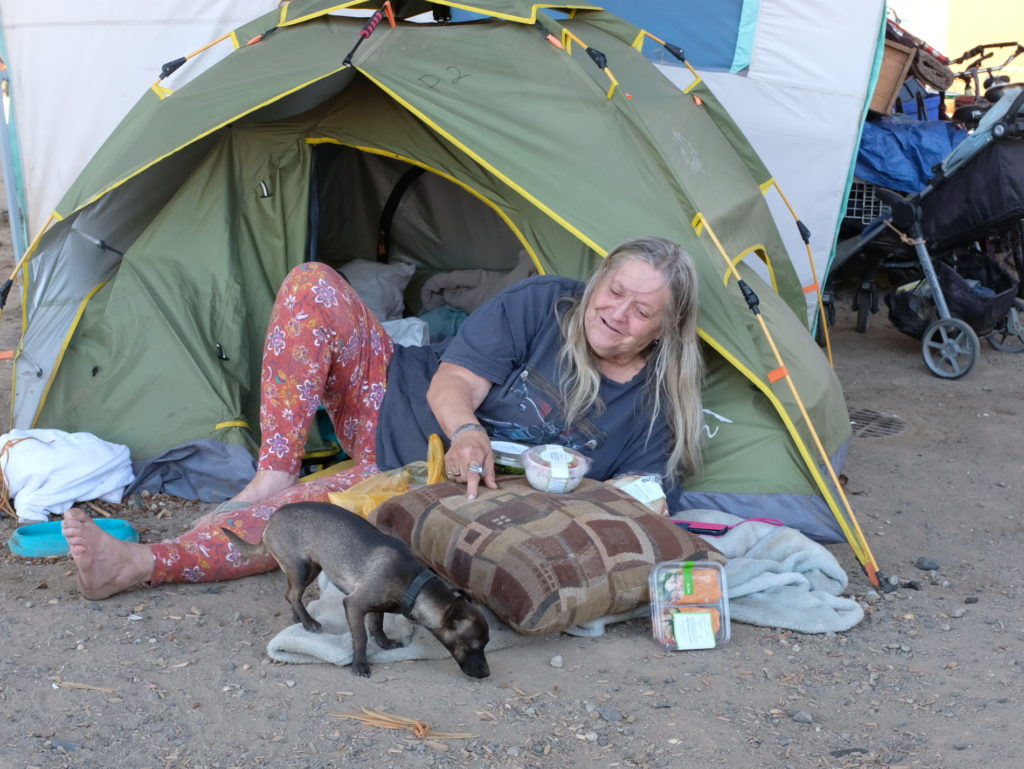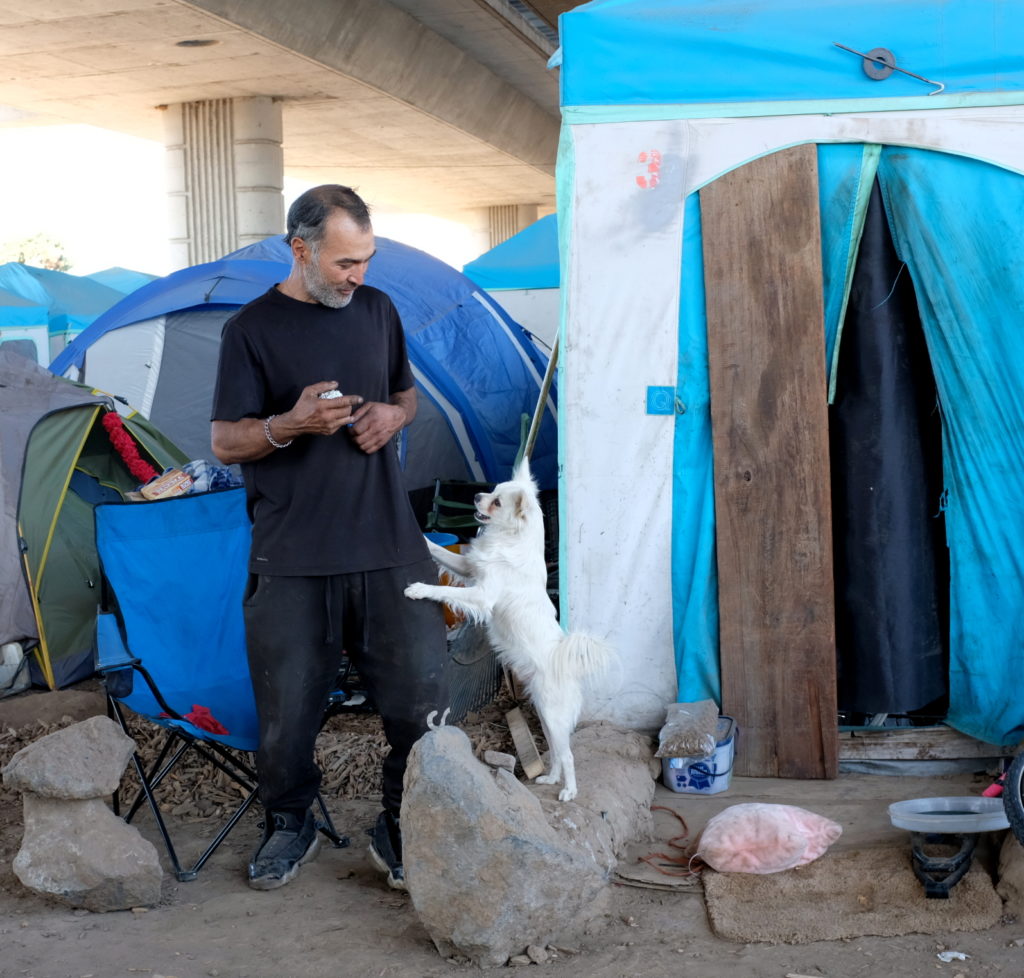
Last Wednesday’s meeting of the Stanislaus Homeless Alliance in Modesto’s City Council Chambers made one thing perfectly clear: There is a huge disconnect between residents of Modesto’s Outdoor Emergency Shelter (MOES) and working members of the Alliance.
While board members were chiefly interested in touting the features of what they have designated as a new low-barrier homeless shelter in the Salvation Army Berberian Building on Modesto’s 9th Street, representatives and members from MOES showed up to plea for keeping the tent camp open; it’s slated to be shut down December 2.
Even the designation as “low-barrier” seems farcical to many people familiar with why homeless shelters tend to fail. Among the most common reasons people cite for avoiding shelters is the ban on pets. MOES residents have received mixed reports about pets in the new shelter, but the last most knew was dogs would be allowed, but only 50 or so, and they must stay in crates next to people’s beds.*
Misty Eckerdt, the driving force behind Bandit’s Furends, a pet charity, estimates there are 300 dogs at MOES. Even allowing for people with more than one dog, that’s far more pets than the new shelter will accommodate.
The new shelter also has an 8:00pm curfew. Again, that’s no one’s idea of low-barrier. While these barriers have received objections, by far the most common complaint among many people at MOES concerns loss of community.
“We have built a community here,” said MOES resident Brad Thompkins recently, “and now they’re going to tear it apart.”
“We’ve got each other’s backs,” said a woman. “We can feel safe here.”
Many residents of MOES with Post Traumatic Stress Syndrome from prison terms say the new barracks setup is too much like a jail.
“I look at those beds and being locked in and it brings back all those bad memories,” said a 52 year old man named Gerald, who’s done time for non-violent crimes.
“You mean to tell me they’re going to take all these people, put them in a bottle, shake it up and think everything’s going to come out nice,” said “Rabbit,” a well-known resident. “They must be crazy.”
Only a few insiders know that racial tensions flared early on when MOES was getting established, but respected resident peace makers and smart police officers calmed things down. Now, MOES residents have almost unanimous respect and appreciation for law enforcement efforts at the encampment. Modesto Police Sergeant Mike Hammond is especially highly-regarded and many members of the Rank Security force have also gained the approval of a population ordinarily highly distrustful of anyone with a badge.
For people desocialized by years on the streets, establishing community friendships and values has been the chief benefit from living at MOES. Many residents slept two or three days straight after first arriving, making up the deficit from sleep deprivation brought on by constant anxiety. Most homeless people fear predators, law enforcement, and angry citizens. MOES gave them a place of their own among peers who valued the relative safety of a tent and neighbors. “We have each others’ backs” became a community ethic.
Now, with winter coming on and rental prices rising in anticipation of coming rent controls, hundreds of people at MOES are facing eviction from a camp that has been their only home for months. With approximately 450 MOES residents and a little over 200 new beds, the numbers simply don’t work, even if the shelter were to accommodate enough pets.
For people who entered MOES with a deep distrust of authority and gradually came to appreciate law enforcement and community values, the uprooting of their lives once again is a cruel blow that confirms their early suspicions—Modesto’s claim to be a “City of Great Neighbors” doesn’t include the unfortunate poor.
*An earlier version of this story reported the dogs would have to stay outside. We have since received updated information. We will always make corrections as we get them.



boo fking hoo. ‘but muh unfair curfew’, who writes this drivel? i have a self-imposed curfew because i have to get up for work, to feed my dog and family. i have no sympathy for thieves and drugs addicts, especially the type that claim they have PTSD from being thrown in jail for being degenerates in the first place. the poor dogs are the true victims, homeless should not be allowed to have pets.
Being tired of the homeless population or denigrating a class of people is not going to make the problem go away.
The homeless shelter is a “one size fit all” solution for a population with diverse problems. Based on the information in the story, more than one approach is needed to abate the problem.
Given the growth in the number of homeless, the do nothing approach of judgmental people like “tired of bums” is not an option. Incarcerating people because they are homeless is not a wise option either.
The best way to solve a problem is to have the cooperation of those who are part of the problem. To gain cooperation, participants should not be forced to do what they perceive as contrary to their own interests.
Regardless of whether one approves of lifestyle choices, the option is to let them stay in an encampment or roam the streets as they did before the encampment was created.
Mental illness is difficult to treat regardless of cause. Those working to reduce the size of the homeless population deserve our support in their effort to make our community better.
Thank you Bruce Frohman, I agree with everything you wrote. I believe MOES is growing in community acceptance and will help some into transition into a better life. Homelessness is not going away and will likely get worse. Many of the homeless now are there because of unaffordable housing. It could happen to many of us.
Most Calif citizens are now well aware that liberal government policies are causing the ruination of this once great state. The population of Calif is 12% of the nation’s total, yet we have 22% of the nation’s homeless people. Not fair, and they obviously vote liberal
http://Www.recallgavinnow.com
If you’re talking about poverty, California doesn’t even make the top fifteen poorest states. And if you’re talking about job growth, California is growing jobs faster than the rest of the nation. That’s one reason we have a housing shortage: People are moving here for the high-paying jobs on the coast, which drives housing prices up not just along the coast but inland. It’s true that California’s environmental regulations make building homes more difficult, but it’s also true that builders prefer to build single-family homes rather than low-income housing because there’s more profit in single-family homes. Given its red-hot economy (fifth overall in the world) and leading-edge position on technology, it’s difficult to argue liberal government has failed, especially since California has had so many Republican governors over the years (Ronald Reagan, George Deukmejian, Pete Wilson and Arnold Schwarzenegger, to name a few of the most recent). California’s housing crisis is in part due to the failure of government to adjust to the new economy, but that new economy has taken most everyone by surprise, conservatives included. As usual, Bruce Frohman’s astute analysis offers a pragmatic approach to homelessness, one we could all benefit from using.
The homeless need to be held accountable for the trash they leave behind. Why can’t they clean up after themselves? Why are we the babysitter who has to clothe them, feed them and now clean up after them?? They need jobs regardless if they are in a homeless camp or not if they want to be taken seriously and want to be part of the community
I’m over them. They get everything for free, respect nothing, trash everything; and yet they want our sympathy too?? No.